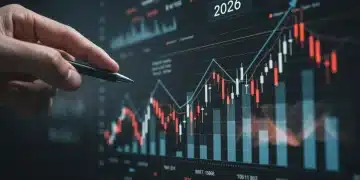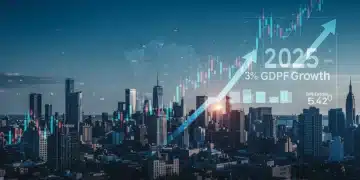Total global economic forecast: what to expect in 2024

The total global economic forecast highlights key challenges such as geopolitical events, technological disruption, and climate change, while also emphasizing opportunities for innovation and sustainable growth in various markets.
Total global economic forecast is not just a prediction; it’s a guide to what we can expect in the coming year. Curious about how shifts in markets can affect you? Let’s dive into the details.
Overview of the global economy
Understanding the global economy is crucial for individuals and businesses alike. It encompasses the interactions among various economic systems and how they affect each other. Let’s explore some key aspects and insights.
Key Characteristics of the Global Economy
The global economy is characterized by complex interdependencies. These involve trade relationships, capital flows, and communication between nations. Several elements shape its structure, including:
- International trade agreements
- Currency exchange rates
- Foreign investments
- Technological advancements
These factors influence how countries interact and develop their economic policies. Additionally, economic performance varies significantly around the world. Some nations experience rapid growth, while others may face stagnation.
Global Economic Indicators
To assess the health of the global economy, we look at various indicators. These include Gross Domestic Product (GDP), unemployment rates, and inflation levels. Monitoring these indicators helps us predict economic trends and make informed decisions.
Moreover, the interconnectedness of economies means that shocks in one region can affect others. For instance, a recession in a major economy can ripple through global markets, impacting trade and investments worldwide.
In summary, the global economy is a dynamic and intricate system. By examining its characteristics and indicators, we gain valuable insights into potential opportunities and risks ahead.
Key factors influencing economic growth
Several key factors drive economic growth, shaping a country’s development and stability. Understanding these influences helps nations plan better for the future.
Investment and Capital
Investment is essential for boosting productivity. When businesses invest in new technologies, they enhance their efficiency. This leads to more output and growth. Strong capital investments can come from both domestic and foreign sources, creating opportunities for expansion.
- Infrastructure projects
- Research and development initiatives
- Education and skill development
- Access to financial resources
Additionally, a well-educated workforce is vital for sustaining economic growth. Education provides individuals with the skills needed to contribute effectively to the economy.
Government Policies
Government intervention plays a crucial role in shaping economic performance. Policies regarding taxation, regulation, and trade can either promote or hinder growth. For example, lower taxes can encourage spending and investment, while excessive regulation may create barriers for businesses.
Moreover, trade policies facilitate access to larger markets, allowing countries to export goods and services. Open trade can enhance competition and innovation, further fueling economic growth.
Environmental factors, such as natural resources and climate conditions, also affect a country’s ability to grow economically. Nations rich in resources often have a head start in industrialization and development.
The impacts of technology should not be underestimated. Advancements in technology can revolutionize industries, creating new opportunities for businesses and enhancing productivity. Embracing technology is essential for a nation aiming to achieve sustainable growth.
Predicted trends in major markets

Keeping an eye on predicted trends in major markets helps businesses and individuals make informed decisions. Understanding these trends can shape strategies for growth and investment.
Emerging Markets
One significant trend is the rise of emerging markets. Countries like India and Brazil are gaining attention due to their growing middle class and increasing consumer demand. As these markets expand, investing in them can provide lucrative opportunities.
- Rapid urbanization
- Increased technology adoption
- Young and dynamic populations
- Growing infrastructure developments
These factors drive economic activity and open doors for businesses looking to tap into new customer bases.
Technological Advancements
Another trend impacting major markets is the rapid pace of technological advancements. Automation and artificial intelligence (AI) are transforming industries. Businesses are leveraging technology to enhance efficiency and reduce costs.
Furthermore, the growing importance of e-commerce is reshaping how goods are purchased and sold. Consumers are increasingly opting for online shopping, requiring businesses to adapt their strategies. This trend is likely to continue, as convenience plays a crucial role in consumer behavior.
Environmental Concerns
In recent years, environmental concerns have become a central focus. Sustainable business practices are gaining traction as consumers advocate for eco-friendly choices. Corporations are adjusting their operations to meet these demands, leading to innovations in sustainability.
Investments in renewable energy and sustainable products are set to grow. The shift towards cleaner energy sources is influencing market dynamics, creating new areas of growth.
Moreover, globalization remains a crucial aspect of market trends. Companies are increasingly looking beyond their borders for opportunities, making international trade vital. As markets become more interconnected, trends in one region can quickly influence others.
Impact of geopolitical events on the economy
The impact of geopolitical events on the economy is profound and can ripple through various sectors and regions. Understanding these effects is crucial for businesses and investors.
Political Instability
Political instability in any region can lead to economic uncertainty. When governments face challenges, investor confidence often declines. This situation can result in decreased foreign investment and slow economic growth.
- Heightened risk perception
- Market volatility
- Increased costs of doing business
- Disruption of supply chains
Countries experiencing unrest may see their currency value drop, making imports more expensive and affecting overall economic health.
International Relations
The nature of international relations significantly affects trade relationships. Tariffs, sanctions, and trade agreements can alter the flow of goods and services between nations. For instance, trade wars can hurt economic growth by increasing costs for consumers and businesses.
Furthermore, successful diplomatic relations can facilitate free trade, enhancing economic collaboration. Countries benefiting from strong alliances often achieve better economic outcomes.
Environmental and Social Factors
Geopolitical events also include environmental and social issues. Natural disasters or pandemics can disrupt economies rapidly. For instance, the COVID-19 pandemic had severe effects on global supply chains and labor markets.
As nations respond to environmental challenges, investments in sustainability and green technologies could rise. In doing so, this could potentially spur economic growth in new industries while addressing societal concerns.
The role of geopolitical events in shaping the economy cannot be overstated. The connections between politics, economy, and society create a complex web of influences that affect us all. Awareness of these dynamics helps form better strategies and responses to the changing global landscape.
Future challenges and opportunities
In the ever-evolving landscape of the global economy, understanding future challenges and opportunities is essential. As we look ahead, various factors will shape economic conditions and the way businesses operate.
Technological Disruption
One major challenge is technological disruption. With rapid advancements in digital technology, businesses must adapt or risk becoming obsolete. Companies that embrace innovation can find new avenues for growth.
- Integration of artificial intelligence
- Automation of jobs
- Improvement in data analytics
- Cybersecurity threats
However, this upheaval also creates opportunities for those willing to innovate. Startups focused on tech solutions may thrive, while established businesses could partner with tech firms to enhance their offerings.
Climate Change
Climate change presents another critical challenge. As environmental concerns grow, economies must shift toward more sustainable practices. This transition can be difficult due to existing infrastructures and industries reliant on fossil fuels.
Yet, this challenge opens up new markets for renewable energy and sustainable products. Companies that prioritize sustainability will not only help the planet but can also gain a competitive edge.
Global Health Issues
Global health issues, highlighted by the recent pandemic, remain a pressing concern. Health crises can disrupt supply chains, decrease consumer confidence, and lead to economic downturns. Businesses need to develop resilience against such eventualities, preparing to pivot quickly when necessary.
Simultaneously, there are opportunities for growth in the health sector. Investments in healthcare technology and resources can address immediate needs and pave the way for advancements in medical care.
Ultimately, navigating these future challenges while recognizing the associated opportunities is critical for sustained economic growth. The ability to respond effectively to changes in technology, environment, and health will define the success of businesses in the years to come.
In conclusion, understanding the total global economic forecast involves recognizing the challenges and opportunities that lie ahead. While geopolitical events, technological disruptions, and climate change present significant hurdles, each also introduces potential for innovation and growth. Adapting to these changes will be crucial for businesses and individuals alike. By staying informed and flexible, we can harness these dynamics to create a more robust and sustainable economy.
FAQ – Frequently Asked Questions about the Total Global Economic Forecast
What impact do geopolitical events have on the economy?
Geopolitical events can cause economic instability, affecting trade relations, investment, and market confidence, ultimately influencing economic growth.
How does technology influence economic opportunities?
Technological advancements drive innovation, enhance productivity, and create new markets, offering businesses a chance to adapt and thrive in a changing economy.
What role does sustainability play in future economic growth?
Sustainability is becoming increasingly important as consumers demand eco-friendly practices, leading to new markets and business opportunities in green technologies.
Why is adaptability crucial for businesses in today’s economy?
Adaptability allows businesses to respond effectively to changing conditions, such as technological disruption and global challenges, ensuring long-term success.





